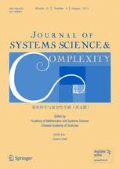Abstract
This paper investigates both the robust semi-global leaderless consensus problem and the robust semi-global containment control problem for a group of identical linear systems with imperfect actuators. The imperfect actuators are characterized by nonlinearities such as saturation and dead zone and there input output relationships are not precisely known. The dynamics of follower agents are also affected by the input additive disturbances. Low-and-high gain feedback consensus protocols are constructed to solve these problems. More specifically, it is shown that robust semi-global leaderless consensus can be achieved over a connected undirected graph and robust semi-global containment control can be achieved when each follower agent has access to the information of at least one leader agent. Numerical simulation illustrates the theoretical results.
Similar content being viewed by others
References
Dimarogonas D and Kyriakopoulos K, On the rendezvous problem for multiple nonholonomic agents, IEEE Transactions on Automatic Control, 2007, 52(5): 916–922.
Hengster-Movric K, You K, Lewis F, et al., Synchronization of discrete-time multi-agent systems on graphs using Riccati design, Automatica, 2013, 49(2): 414–423.
Su H, Wang X, and Lin Z, Flocking of multi-agents with a virtual leader, IEEE Transactions on Automatic Control, 2009, 54(2): 293–307.
Ma C, Li T, and Zhang J, Consensus control for leader-following multi-agent systems with measurement noises, Journal of Systems Science & Complexity, 2010, 23(1): 35–49.
Oh K, Park M, and Ahn H, A survey of multi-agent formation control, Automatica, 2015, 53: 424–440.
Meng Z, Ren W, Cao Y, et al., Leaderless and leader-following consensus with communication and input delays under a directed network topology, IEEE Transactions on Systems, Man, and Cybernetics, Part B: Cybernetics, 2011, 41(1): 75–88.
Li Z, Ren W, Liu X, et al., Consensus of multi-agent systems with general linear and Lipschitz nonlinear dynamics using distributed adaptive protocols, IEEE Transactions on Automatic Control, 2013, 58(7): 1786–1791.
Wang L and Guo L, Robust consensus and soft control of multi-agent systems with noises, Journal of Systems Science & Complexity, 2008, 21(3): 406–415.
Liu Z, Chen Z, and Yuan Z, Event-triggered average-consensus of multi-agent systems with weighted and direct topology, Journal of Systems Science & Complexity, 2012, 25(5): 845–855.
Ren W, Distributed leaderless consensus algorithms for networked Euler-Lagrange systems, International Journal of Control, 2009, 82(11): 2137–2149.
Liu H, Xie G, and Wang L, Containment of linear multi-agent systems under general interaction topologies, Systems & Control Letters, 2012, 61(4): 528–534.
Li Z, Duan Z, Ren W, et al., Containment control of linear multi-agent systems with multiple leaders of bounded inputs using distributed continuous controllers, International Journal of Robust and Nonlinear Control, 2015, 25(13): 2101–2121.
Meng Z, Ren W, and You Z, Distributed finite-time attitude containment control for multiple rigid bodies, Automatica, 2010, 46(12): 2092–2099.
Wang Y, Cheng L, Hou Z, et al., Containment control of multi-agent systems in a noisy communication environment, Automatica, 2014, 50(7): 1922–1928.
Cao Y, Ren W, and Egerstedt M, Distributed containment control with multiple stationary or dynamic leaders in fixed and switching directed networks, Automatica, 2012, 48(8): 1586–1597.
Li Y, Xiang J, and Wei W, Consensus problems for linear time-invariant multi-agent systems with saturation constraints, IET Control Theory & Applications, 2011, 5(6): 823–829.
Wu Z, Li J, and Song F, Semi-global leaderless consensus with input saturation constraints via adaptive protocols, International Journal of Research in Engineering and Science, 2015, 3(10): 36–42.
Su H, Chen M Z Q, Lam J, et al., Semi-global leader-following consensus of linear multi-agent systems with input saturation via low gain feedback, IEEE Transactions on Circuits and Systems I: Regular Papers, 2013, 60(7): 1881–1889.
Su H, Jia G, and Chen M Z Q, Semi-global containment control of multi-agent systems with input saturation, IET Control Theory & Applications, 2014, 8(18): 2229–2237.
Lin Z, Low Gain Feedback, Springer, London, 1998.
Hu G, Robust consensus tracking of a class of second-order multi-agent dynamic systems, Systems & Control Letters, 2012, 61(1): 134–142.
Wen G, Duan Z, Zhao Y, et al., Robust containment tracking of uncertain linear multi-agent systems: A non-smooth control approach, International Journal of Control, 2014, 87(12): 2522–2534.
Shi L, Zhao Z, and Lin Z, Robust semi-global leader-following practical consensus of a group of linear systems with imperfect actuators, Science China Information Sciences, 2017, 60(7): 1–12.
Lin Z, Robust semi-global stabilization of linear systems with imperfect actuators, Systems & Control Letters, 1997, 29: 215–221.
Author information
Authors and Affiliations
Corresponding author
Additional information
This research was supported by the National Natural Science Foundation of China under Grant No. 61733018, Shanghai Natural Science Foundation under Grant No. 17ZR1445400, China Postdoctoral Science Foundation under Grant Nos. 2017M610233 and 2016T90373, the Fundamental Research Funds for Central Universities under Grant No. 222201714030, and the US Army Research Office under Grant No. W911NF-17-1-0535.
This paper was recommended for publication by Editor CHEN Jie.
Rights and permissions
About this article
Cite this article
Shi, L., Zhao, Z. & Lin, Z. Robust Semi-Global Leaderless Consensus and Containment Control of Identical Linear Systems with Imperfect Actuators. J Syst Sci Complex 31, 69–86 (2018). https://doi.org/10.1007/s11424-018-7086-z
Received:
Revised:
Published:
Issue Date:
DOI: https://doi.org/10.1007/s11424-018-7086-z


